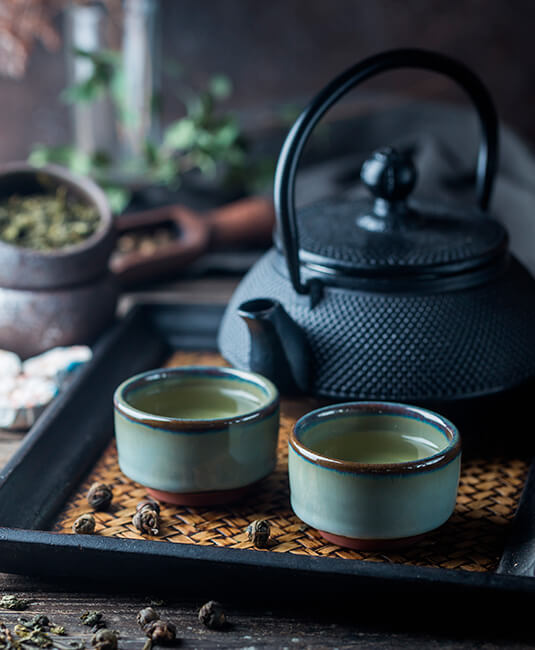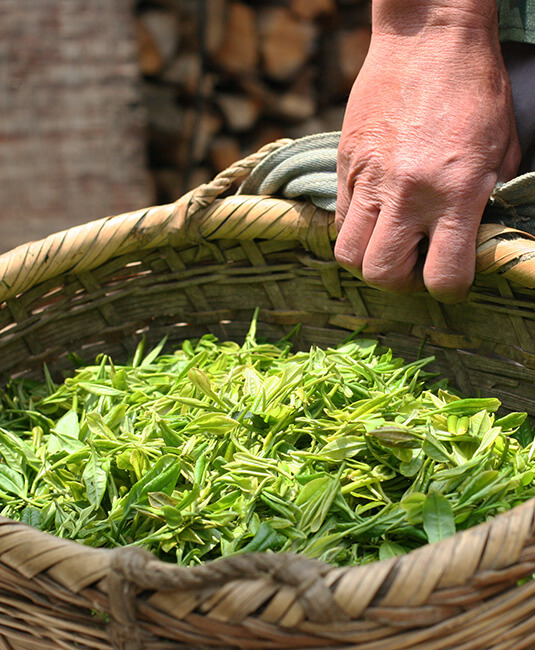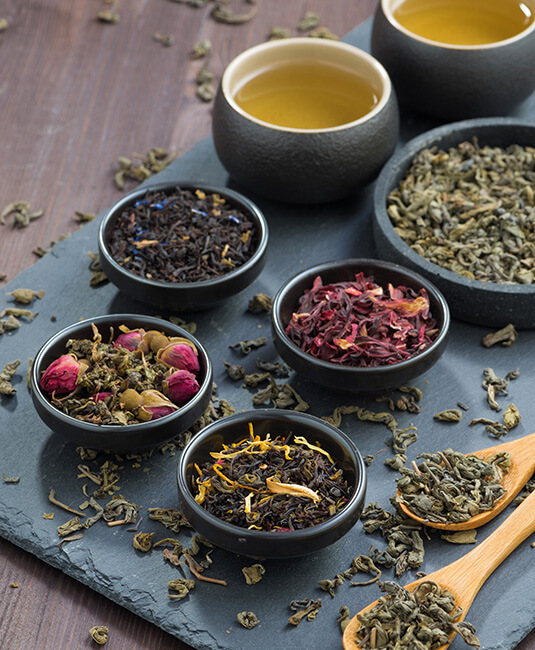Free shipping from $55

Should you avoid drinking too much tea?
Excessive consumption of tea, typically beyond 4 to 6 cups per day, can lead to the excessive intake of certain substances that may have potentially harmful effects on the body:
- Theine (caffeine): While the caffeine in tea is absorbed more slowly than that in coffee and is present in more moderate amounts, excessive consumption can lead to irritability, difficulty concentrating, or sleep disturbances, especially in individuals who are genetically sensitive to caffeine. Pregnant or breastfeeding women, in particular, should not exceed 200 mg, which is equivalent to a maximum of 3 cups of tea per day.
- Fluoride: Tea leaves contain a notable amount of fluoride, ranging from 1 to 8 mg per gram of leaves. However, the body only requires 2.5 to 3 mg of fluoride per day. Beyond an intake of 0.1 mg per day per kilogram of body weight (6 mg/day for a person weighing 60 kg), there is a risk of fluorosis, an excess of fluoride that can weaken bones and teeth. According to a study conducted in Ireland, heavy tea consumers can easily reach a fluoride intake level that is hazardous to their health. Therefore, it is advisable to consume tea in moderation (up to 4 to 6 cups per day) and opt for higher-quality teas, as they have been found to contain lower fluoride levels compared to lower-priced options.

- Oxalates: Tea is among foods rich in oxalates, molecules that can potentially contribute to the development of kidney stones. Individuals prone to urinary calculi are advised to limit their tea consumption to 2 cups per day, while simultaneously consuming calcium-rich foods (primarily dairy products) to bind with oxalates and reduce their intestinal absorption.
- Pollutants: Numerous studies have raised concerns about the occasionally elevated levels of pollutants in certain teas, including pesticides, herbicides, heavy metals, and microplastic particles. In 2012, a study by "60 millions de consommateurs" identified several tea brands with traces of pollutants among 30 brands of tea bags. In 2014, the Canadian Food Inspection Agency reported that five out of the world's top 10 best-selling tea brands exceeded permissible levels of pollutants. To mitigate potential exposure to pollutants, it is advisable to turn to reputable tea companies that have strong relationships with their producers and opt for loose-leaf tea rather than tea bags.
With SafeTea, the purity of teas, achieved through high-quality production methods, is at the core of Palais des Thés' commitment.
Does tea stain teeth?
Yes. Indeed, the main culprits behind this are primarily the tannins contained in tea, which can gradually lead to brown discoloration as they are absorbed by the naturally porous enamel of teeth. In addition to tannins, polyphenols in general, along with theaflavins and thearubigins found in black teas, may contribute to this effect. To address this cosmetic concern, it is advisable to either brush your teeth after consuming tea or, if that's not possible, thoroughly rinse your mouth with clean water.
Does green tea have more adverse effects on the stomach compared to black tea?
Scientific evidence does not support the notion that tea, whether black or green, is harmful to the stomach, except in cases of individual hypersensitivity. On the contrary, numerous recent studies have established the absence of a connection between tea consumption and gastrointestinal conditions such as gastritis, reflux, dyspepsia, or ulcers. Flavonoids, especially catechins found predominantly in green tea, actually play a protective role in the digestive system by inhibiting the growth of Helicobacter Pylori bacteria, known to be associated with gastrointestinal issues.
However, it's important to be cautious about two key factors: avoid consuming tea at extremely high temperatures, as this can potentially lead to esophageal damage that may develop into cancer. Additionally, like any beverage, overconsumption of tea, especially during meals or in the evening when prone to gastroesophageal reflux, should be avoided.

Can tea flavors cause allergies?
Flavorings, whether derived from natural sources (extracted from natural ingredients) or created synthetically (produced industrially using aromatic molecules), are widely used in our food to enhance taste. However, there is limited available data regarding their potential health effects.
While isolated instances of allergic reactions to specific components, particularly those from natural sources like bergamot or chamomile, have been reported, such occurrences are rare. Individuals with allergies, who are at greater risk, should exercise caution and seek advice from their allergist regarding the possibility of cross-allergies with the botanical ingredients found in fragrant blends.
